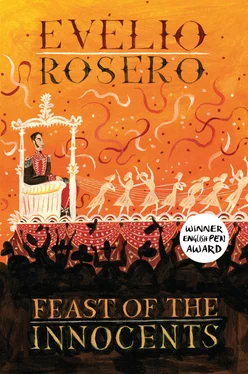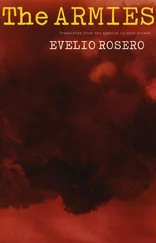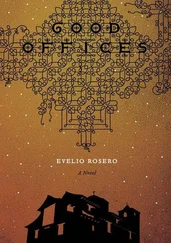The carnival blazed up more brightly, right across the street. The music strolling past got louder: a group of revellers were dancing a step away from them. All of a sudden, as if obeying the impulse for one last burst of joy, or because a suspicion of the sacrifice entered his head for the first time and he wanted to run away, Rodolfo Puelles threw himself into the centre of the human wheel and began to dance, transfigured, pop-eyed, shouting “ viva! ”
Quiroz and Platter stayed at the edge, looking at him in astonishment: they had not expected him to do that. Platter took a step forward, to catch hold of Puelles.
“Leave him,” Quiroz said. “Let him finish dancing.”
The little carnival band was playing “La Danza de la Chiva”: it finished with a clatter of cymbals, the trumpet bade farewell, and a sea of applause came crashing down. The people dancing offered Puelles a bottle, and Puelles drank, he drank and went on drinking, down to the last drop.
“That’s it, that’s it,” Platter told him, “have one for the road, because we’re taking you to paradise now.”
“Follow us,” Quiroz said.
And Puelles followed them.
He thought that he did not mind.
The light from the sun became reddish, a cold red light, eerie at this hour of explosions. They made their way quickly through the streets, despite the crowds.
They left the carnival, which meant, in effect, leaving Pasto.
It had been Zulia Iscuandé who called on the artisans to put up a fight — they had already given the float up for lost. “We can’t end on bad terms with the doctor,” she said, “and it’s not about his money; the fact is that we made the carriage ourselves and those heartless bastards are going to wreck it.” Cangrejito Arbeláez had no illusions: even if they did get the float back it would be difficult to exhibit it, with the army in the way plus the balaclava boys, who would soon surround them, pop up where they might; the Pastusos were the only hope, he thought, the people of Pasto might defend the carriage, but how? It was unlikely they could count on this defence: this was a fiesta, people went out to dance, how does one arrange a battle overnight for the sake of a carnival float? A float that only seemed like a bit of fun at the outset. The urgent thing was to hide the carriage from obliteration, it would have to bide its time for all Pasto to come to its defence.
He heard the artisans shouting “ viva! ” for the doctor. “Thanks to him, on behalf of the float-makers,” he heard: “We’re not going to abandon him, dammit,” “Let’s get a move on,” “Here we go.” The sculptor observed the makers’ large, deeply lined hands, which looked carved from stone; they had painted their faces; they got out bottles of aguardiente and pretended to start the January 6 binge, but they were off to recover the carriage from the hands of the army, no less. And they set off at a run through the sleeping streets, in pursuit of the stolen float.
It was also Zulia Iscuandé who started the battle. She offered a swig of aguardiente to the soldier nearest her, who was perched up on the shrouded carriage, holding the bottle out to him, and when the soldier went to take it, he got smacked around the face with it instead. In minutes the soldiers were disarmed and hurled from the carriage as if by an unstoppable whirlwind — with the same rage and courage as in the days of Agustín Agualongo, Cangrejito reflected while he fought. It was a silent and speedy battle. Just one shot was fired, which got lost in the cries of “ viva! ” from the assailants: the officer fired; he was driving the truck the float was embedded on, and his shot hit Maestro Umbría in the arm, up on the running board alongside him; in spite of the burning bullet, the maestro stretched out his other arm and took the officer by the throat, pulling him out through the little window by brute force. The few inquisitive onlookers who caught a glimpse did not understand what was going on, just a “dressed” float, as they put it, and a few soldiers chatting with some early birds. They were not chatting, they were grateful to still be alive: the attackers occupied the cab of the truck, the various vantage points on the carriage, and made off.
In the isolated neighbourhood, which Puelles was struggling to recognize — wasn’t it here I played spinning tops, as a kid, and won? — the dirty, narrow streets of unfinished cement houses, looking like black, upside-down skeletons as night fell, started to oppress him, but he was crushed altogether by the shock he got on the last corner, in the dusk, when the houses were already petering out: three or four boys were playing war, they fell and died, came back to life, killed again.
Now Puelles saw wheat fields, not far away, behind the last house.
“And what have you got in your pocket, Puelles, a stone?”
Platter had slipped a hand into his trouser pocket and went on, amazed:
“Yes, it is a stone, for pity’s sake. For killing wood pigeons? Self-defence?”
“And that cross?” Puelles said to Platter, pointing to the gold crucifix dangling from his neck. “Did Father Bunch give it to you?”
Platter stopped walking.
“Christ was the first of us,” Quiroz said. “Don’t sneer, Puelles. We have a religion too.”
He signalled to Platter for him to keep on walking with them.
“Ah, religion,” Puelles said, and once more the hidden poet peeped out. “Mankind’s worst and most perfect intolerance.”
“Yeah right,” Platter said. “Now you’ve taken it into your head to talk like that crazy Chivo, you philosophizing prick. Who do you think you are? You want to have it out with me?” And he broke into a string of rapid insults, which Puelles ignored; but he could not help laughing on hearing the last: revolting revisionist.
I can laugh, Puelles thought, it’s still possible.
“Steady, Ilyich,” Quiroz said. “There’s time.”
They had left the neighbourhood of grey houses behind them now. Everything was green in the failing light. Now they were treading on soft, lush grass, the damp earth. Around him Puelles saw rolling hills knitted together, the ruddy sky. They carried on towards the fields of high yellow wheat, swaying just a little further on, ruffled by the wind. Puelles no longer felt the desire to talk, to ask anything. Much less to flee. It was as if a great lethargy towards everything and everyone, including himself, were stored up in his limbs, in his intelligence. He remembered the dead policeman again, like so many times before, and now he could not go on, he could not go on. He could not go on. And he smiled dumbly; he wondered whether, when he died, as had happened when he killed, he was going to piss himself with fright. Neither Platter nor Quiroz paid him any attention.
Now they were crossing the field sown with wheat. The stalks were tall, they brushed Puelles’s chest.
“Ah, Puelles,” Quiroz said. “Why did you have to talk so much?”
Puelles did not answer.
“Relax, Puelles, we’re not going to do anything to you,” Quiroz went on. His voice had gone hoarse; he seemed to want for air. “We’re just going to execute you.”
Puelles felt an immense tiredness: when I die I’ll think of Grand-father, or will I think of Toña Noria’s enchanted vagina, enchanted because she never gave it to me?
The tremendous fatigue befuddled him. He thought it was not just a fatigue of his bones, but reached far beyond him, to the entire universe.
“Here, here,” he told them.
He wanted to rest in that place, hidden in the middle of yellow wheat, at dusk, looking at the sky. He felt exhausted, and yet, surprising himself, remembered he had often run the marathon at school and won, the hundred-metre dash too, a hare, and, as if dreaming, he broke into a run, and believed he ran faster than a hare, turned to look, they were close, deranged faces, arms stretched out, they could touch him, but he would get home and carry on to Bogotá and then Singapore, he thought, and thought on, managing to have time to think — they’ll say Puelles got away.
Читать дальше












